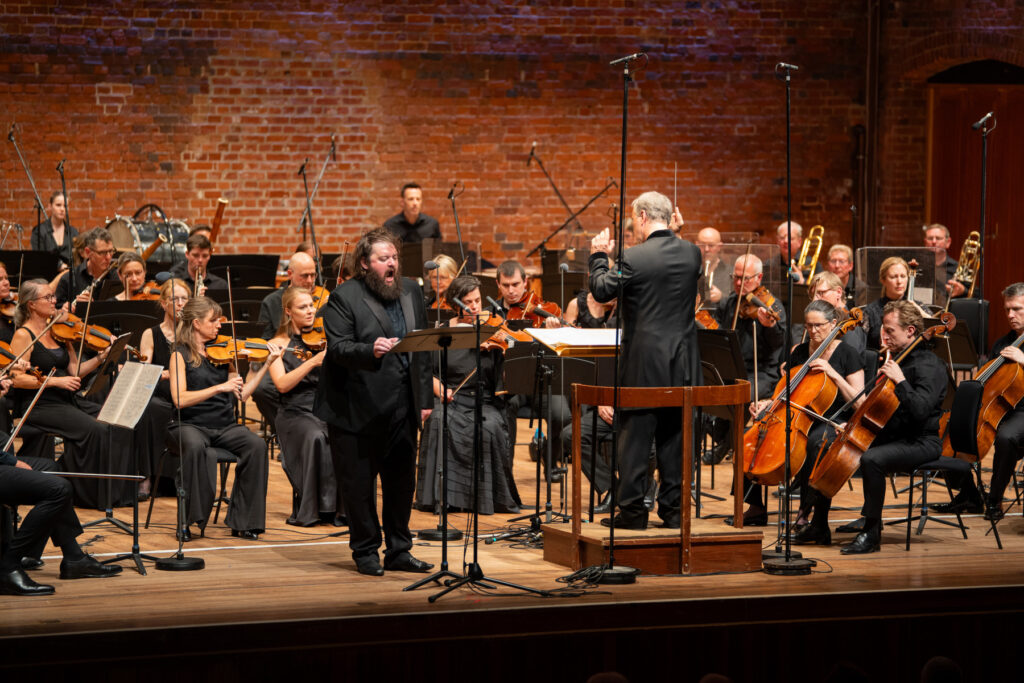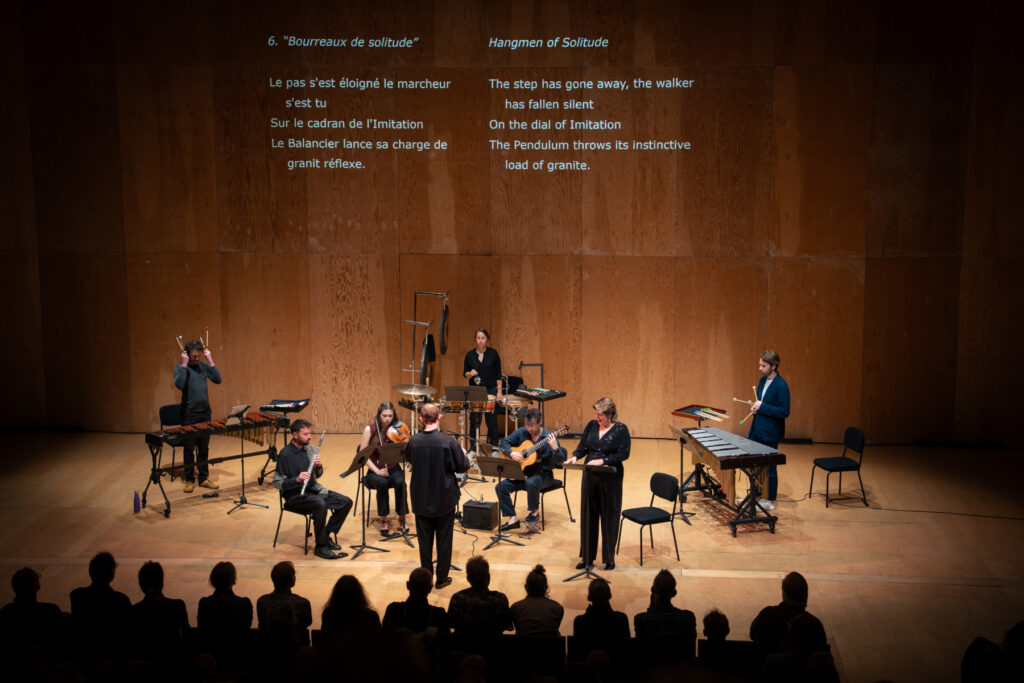“No one likes us, we don’t care” cheer the supporters of Millwall Football Club – words that might just as well belong to Pierre Boulez and his followers. It’s certainly not something one would associate with Benjamin Britten whose Our Hunting Fathers formed part of the second instalment of a visit from the BBC Symphony Orchestra to Snape Maltings at the Aldeburgh Festival.
In the four years between Britten’s Sinfonietta of 1932 and his orchestral song cycle Our Hunting Fathers he had progressed from precocious student to an ambitious young professional. Whilst he didn’t dismiss his earlier works, he considered his ‘symphonic cycle for high voice and orchestra’ as a breakthrough work and his unofficial Op. 1. It showed considerable advance in his use of the orchestra and which, like his Op. 1 Sinfonietta, caused rehearsal difficulties before its 1936 premiere (Norfolk and Norwich Triennial Festival), the players of the London Philharmonic Orchestra not taking seriously the work of a 22-year-old. Attitudes to the work were not helped by W. H. Auden’s pacifist views obliquely expressed in the manner of an animal rights campaigner, a stance with which Britten clearly identified. Unloved by the audience and critics, the work was not heard again live until 1950.

The first Boosey & Hawkes vocal score makes clear Britten intended the work for a soprano (it was originally sung by Sophie Wyss), later allowing performance by a tenor, a version I think is more persuasive. In this performance Allan Clayton had the measure of this emotionally demanding work, sailing through the hysteria of ‘Rats Away!’, unfazed by its scurrying figures and hurling himself at the high tessitura with all the dexterity of a trapeze artist. Arguably, it’s a movement where vocal warmth must be traded for steel, and in this Clayton excelled. Earlier, in the mock grandeur of the ‘Prologue’, there was nobility and a hint of irony in the voice at ‘O pride so hostile to our charity’. A haunting beauty occupied the elegiac and more overtly lyrical ‘Messalina’, Clayton now bringing a bitter tang to this lament for a dead monkey, the obsessive gestures at ‘Fie’ arresting for their passion. The vocal challenges and word play within ‘Hawking for the Partridge’ were dispatched with striking virtuosity, his vocal technique and musical intelligence (not least his superb diction when reciting the names of the hounds) nowhere more apparent in this furious diatribe about man’s inhumanity to man and animals. And then a certain despair in the voice for the concluding ‘Epilogue and Funeral March’, the whole sung with fierce conviction and a passionate intensity.
Proceedings had begun with Helen Grime’s fastidiously crafted Night Songs, written in 2012 for the 60th birthday of Oliver Knussen. Lasting some five minutes and packed with rewarding sonorities, its frenetic energy derived from the ‘melancholy and fantastical’ atmosphere of a ‘magical’ box created by the American artist Joseph Cornell. After the interval, horn player Ben Goldscheider joined the BBC Symphony Orchestra for a new concerto by Brian Elias. Completed in 2023, it’s a work where time is stretched and contracted repeatedly, reflected in alternating passages of nervous tension and playful lyricism. Both aspects were fully realised by Goldscheider whose impish delight in this attractive work did much to disguise its conservative idiom. Sakari Oramo and his BBC players were excellent collaborators. The evening concluded with a barnstorming account of Sibelius’s Fifth Symphony, its first movement superbly controlled in terms of balance and tempo. The central Andante had the feel of a country dance, and its mood, notwithstanding brief tensions, anticipated an uplifting finale, its close bringing tumultuous applause.

The following afternoon showcased James Dillon’s 12 Caprices which replaced a still-to-be-completed work by American composer Tyshawn Sorey. Impossible to know if we missed anything significant, guitarist Sean Shibe kept us spellbound in Dillon’s exquisite miniatures, variously meditative and puckish, their intimacy and quiet joy fabulously communicated by this Scottish virtuoso.
Up next, and on a different remove entirely, was a work from 2010 by the experimental Canadian composer Cassandra Miller. From 2010, her Bel Canto, which she calls a “portrait of Maria Callas”, belongs to a series of pieces drawing on pre-existing music. Her starting point began with hearing live recordings of Callas singing Puccini’s ‘Vissi d’arte’ (Tosca), from which Miller focuses on minute details of the singer’s voice, reproducing her characteristic vibrato, swoops and portamento into fragmented textures framed within two small chamber ensembles: guitar, flute and clarinet, plus violin, viola and cello. Miller observes in the programme details about her piece that “time slows down … to allow for … meditative stillness”, and there was certainly a hallucinogenic quality to the performance, gripping for quietly sustained chords, keening gestures and eerie string slides, while mezzo-soprano Ema Nikolovska wove an extraordinary series of abbreviated sighs and non-specific pitches on ‘ya and ‘ah’. Just when the work’s sonic landscape has lulled us into a trance, Miller changes gear and ends her work with obsessive reiterations, the vocal part vividly alive, with Nikolovska taking up every fresh challenge of this strikingly radical work.
The concert ended with a landmark work from Pierre Boulez, an iconoclast with incendiary views including his wish to liberate Western music from what he regarded as its shameful decadence. His 1954 suite Le Marteau sans maître (“The Hammer Without a Master”) is based on a cycle by the Surrealist poet René Char and written for a deliberately non-Western ensemble of alto flute, viola, guitar, vibraphone, xylorimba and a huge array of other percussion instruments. One of its most striking qualities is the strange partnership between lightness and expressive freedom coupled with an extraordinary compositional rigour. Under Alphonse Cemin’s incisive direction, the players were fully immersed in the Boulez’s finely differentiated palette. They played with impeccable technical control and finesse and were alert to every expressive and metrical change in a score riddled with performance instructions. Nikolovska’s rich-toned mezzo blended ideally with the ensemble’s middle registers, and shaped Char’s bizarre poetry with the requisite detachment, the close of ‘l artisanat furieux’, just one example of perfection where Nikolovska and Adam Walker’s flute were flawlessly together. Judging from this appreciative audience, I suspect even a Millwall Football Club supporter might have been impressed.
David Truslove
Sunday 22 June 2025 – Snape Maltings Concert Hall, Suffolk
Helen Grime – Night Songs; Britten – Our Hunting Fathers, Op. 8; Brian Elias – Horn Concerto (world premiere); Sibelius – Symphony No. 5 in E flat, Op. 82
BBC Symphony Orchestra; tenor – Allan Clayton; French Horn – Ben Goldscheider; Conductor – Sakari Oramo
Monday 23 June 2025 – Britten Studio, Snape
James Dillon – 12 Caprices; Cassandra Miller – Bel Canto; Boulez Le Marteau sans maître
Ema Nikolovska, mezzo-soprano; Adam Walker, flute; Matt Hunt, clarinet; Mira Benjamin, violin; Emma Wernig, viola; Colin Alexander, cello; Sean Shibe, guitar; George Barton, percussion, xylorimba; Owen Gunnell percussion, untuned percussion; Sam Wilson, percussion, vibes; Alphonse Cemin, conductor.
Top image: Boulez at 100 © Britten Pears Arts